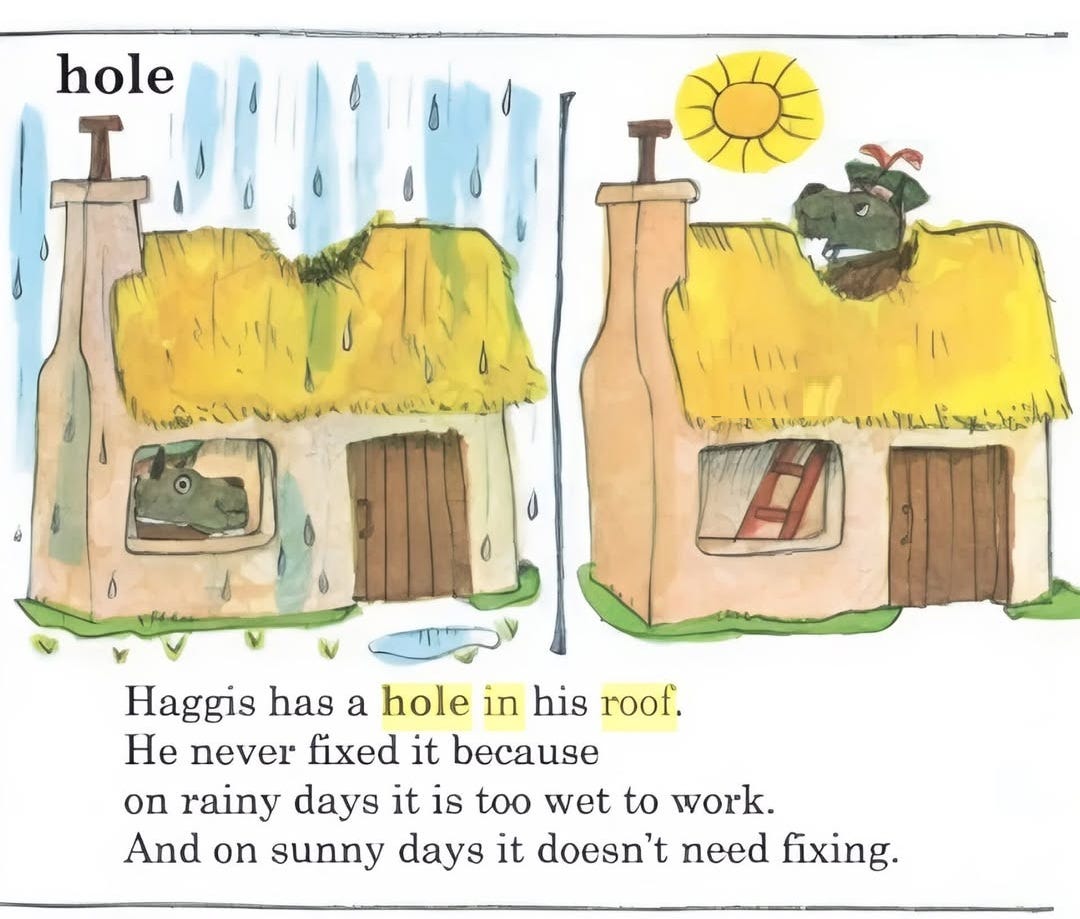Are you lazy? Good.
Exploit your built-in feature.
Laziness OS
Exploit your built-in feature.
.
Do You Need To Fix Your Roof Or Not?
The World Is Full Of Haggises.
Some of them have their time of their lives. Others are miserable until their last day. Some of them are rich. Others rot until their last breath.
Why? Because of how they use their laziness.
There are 5 main types of laziness.
But before diving to this rabbit hole, a hard pill to shallow:
.
.
Laziness Is A Feature. Not A Bug.
Laziness can be rest. Recovery. Incubation time before your grand Eureka. Shield for burnouts, stress, entropy.
I’ve been lazy and super productive: Got things done in both states.
During my lazy days my head reflects, processes. But don’t take only my word for it: Archimedes found his answer in the tub. Not the lab.
Laziness can be a blessing: To prevent burnouts, preserve resources, and spark creativity. To protect your fire.
School taught us that laziness is a moral failure.
But it is a product of our biology. A feature. Not a bug.
Nature built laziness for survival. Rest. Low effort states. Minimal action choices.
Sure, like everything it can become maladaptive once overused.
Especially when it blocks necessary action, growth, or flow:
Inspired from Mihaly Csikszentmihalyi Flow
.
Apart from the fact that I am selling my Flow Pantheon (shameless plug), flow is what you need to escape entropy. And to thrive in the cognitive economy:
.
.
The Cognitive Economy
The brain burns a lot of energy (about 20% of your daily use), so it constantly seeks efficiency. Heuristics save mental energy by trading a bit of accuracy for a lot of speed. This tendency is called “cognitive economy.”
.
Daniel Kahneman described the two modes of thinking in his book Thinking, Fast and Slow:
System 1: fast, automatic, intuitive, impulsive
System 2: slow, deliberate, analytical, effortful
Which should you use? Depends on your challenges x skills per case.
.
We generalize, stereotype, and rely on intuition to cut processing load. When mental energy is low (decision fatigue, mental load, exhaustion), the brain “downshifts” so you choose easier, less effortful options.
Heuristics are brain shortcuts. Your mental autopilot.
Quick rules your mind uses so you don’t waste energy overthinking every little thing.
“You don’t calculate physics when you catch a ball. Your brain just knows where to move. That’s a heuristic: a mental rule that usually works fast enough.”
Also:
“Expensive must mean better.”
“If everyone is {action}, I should too.”
“I’ve seen this before so I know what to do.”
While these might save time, they can also trick you.
Heuristics are the lazy genius of your brain. Fast, efficient, and sometimes wrong.
But Bill Gate’s got your back here:
.
.
The Bill Gates Mantra
Although attributed to others before him, this quote can save you from misery:
“I choose a lazy person to do a hard job.
Because a lazy person will find an easy way to do it.”
— Bill Gates
You don’t have to be a billionaire or even have employees to apply this.
Simple, pick your laziness when necessary to find the smart road.
But guard yourself from laziness when it works against you, not for you.
Because laziness is a feature, not a bug, ad it can be a great servant.
But a terrible master.
So here are the 5 common types. Use them as you must and desire:
.
.
The 5 Common Types Of Laziness
Existential Apathy
Cognitive Laziness
Learning Laziness
Strategic Laziness
Action Laziness
Let’s go tactical, one by one:
.
1.Existential Apathy
“Why bother? Nothing matters.”
→ Attack actions to something you find meaningful.
→ No matter how small. No “save the world” or hero. More like “be the kind of person I’d respect:”
→ Mentor. Movie character. Friend. Imaginary future self.
.
2.Cognitive Laziness
“Thinking is hard. Don’t make me think.”
→ Steelman everything. Before rejecting an idea, try making the strongest version of it.
→ Keep your brain in shape.
→ Ask “What would I do if I wanted to ruin this?” to discover better paths.
.
3.Learning Laziness
“Why should I learn this? I already know enough.”
→ Find the sweet spot of Consume ~ Create.
→ Only allow yourself to learn if you output immediately.
→ No passive scrolling. No cheap dopamine.
→ Every time you say “I don’t know” and skip it, take notes.
→ Then pick what you need to learn.
→ You owe yourself answers.
.
4.Strategic Laziness
“Planning is a waste of time. I’ll just do.”
→ Are you thinking? If not, stop and plan.
→ Force limits. Fewer options.
Start with the goal.
→ Work backward. Fill the blanks.
→ Force intentionality without overplanning.
.
5.Action Laziness
“Too much effort. It can wait.”
→ Parkinson Law Sprints.
→ Fast working bursts with a countdown.
→ No breaks. One clear goal. The “beat the clock” rewires the doing muscle.
→ Tell someone. Make it public. Post a proof-of-work. Action loves exposure.
**** Parkinson’s Law = Work will expand to fill the time allotted for its completion.*
You can use a simple stopwatch. Your smartphone (not recommended, notifications destroy your flow & focus).
Or my ugly Parkinson-inspired timer I made for fun:
https://wintime.georgelongovitis.com/
.
That’s all for now.
Use your laziness.
Thank you for reading.
Lifeward,


